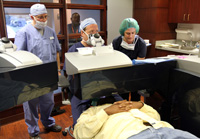|
by David Quick
Of The Post and Courier
Army veteran Damiene
Green will never forget one of many
horrific battles he faced in Iraq during a
tour in 2004-05.
"I was standing up in the middle of an
attack and rockets were firing and people
were getting blown up all around me. I
could barely see. People were telling me
to get down," Green said. "I managed to
get through it without a scratch."
When the Kingstree
native said he couldn't see, it wasn't
because of the conditions. He really
couldn't see well. Never has.
 Kenneth Batie
(background) watches Dr. George Waring
IV perform Lasik surgery on his friend
Damiene Green at Magill Vision Center
last month. To watch a video on Lasik
surgery, visit http://tinyurl.com/brr8bx9. Kenneth Batie
(background) watches Dr. George Waring
IV perform Lasik surgery on his friend
Damiene Green at Magill Vision Center
last month. To watch a video on Lasik
surgery, visit http://tinyurl.com/brr8bx9.
Poor vision has plagued
Green all his life, starting with
emotional scars from being teased for
wearing "Coke bottle" glasses as a child,
which he stopped doing, and subsequently
began failing seventh grade.
But two weeks ago, the
28-year-old Trident Technical College
student and a dozen other people became
the first in the United States to have
Lasik surgery using the Alcon Refractive
Suite at the Magill Vision Center at
MUSC's Storm Eye Institute.
Green said his life is
renewed. His first order of business is
getting a driver's license, finishing his
school work and becoming more physically
active.
Fast and precise
The suite features two lasers, the
Wavelight FS200 Femtosecond Laser and the
Wavelight EX500 Excimer Laser, that offer
the fastest — mere seconds — bladeless
vision correction in the United States.
The first laser cuts a flap, and the
second corrects the "refractive error," or
the issue requiring contact lenses or
glasses.
The technology allows
doctors to tailor treatments for patients'
individual needs — nearsightedness,
farsightedness, astigmatism or age-related
pre-presbyopia — using a fully
customizable laser machine.
Besides speed, the
precision of the machine is touted for
producing better outcomes, minimizing
recovery time, and being the safest
machine of its kind.
"This is the most
advanced laser available in the United
States, mostly due to its speed and
customization," said George Waring IV,
M.D., medical director at Magill and
director of refractive surgery at Storm
Eye.
Putting the technology
in perspective, Waring describes the
refractive suite as a "quantum leap" from
the earliest days of laser eye surgery in
the 1990s and a "major breakthrough" since
2000.
Waring said patients
usually see better immediately following
the surgery, and the majority have "super
vision," or better than 20/20 vision,
within 24 hours. He added that people ages
18 to 65 are eligible for the surgery.
The cost comes in at
about $2,500 per eye, which Waring said is
"a little more expensive" than other Lasik
surgery. Insurance does not cover the
surgery, though some health savings plans
allow it to be covered.
"We're excited to offer
this," Waring said. "It's a great thing
for MUSC to offer this world-class
technology."
The dentist
Like Green, 31-year-old dentist Walter
Renne, DDS has been troubled by poor
vision all his life. Without thick glasses
or contacts, he couldn't see clearly 3
feet beyond his face.
All the things I loved
doing in life — like camping or surfing —
I was handicapped," Renne said. "If I lost
or broke my glasses or my contacts came
out, I would literally be blind."
He was reluctant,
however, to do laser surgery until now
because he depended on "super-crisp
vision" for his career. Renne, who teaches
technology at the MUSC dental school,
gained more confidence with the new
lasers.
While he could see
better immediately after the surgery, his
vision improved immensely three days
following the surgery.
"And it keeps getting better," Renne said.
"It's amazing that the surgery took place
faster than it took me to put a contact
lens in my eye."
Editor's note: This
article ran in the Dec. 3 issue of The
Post and Courier and is reprinted with
permission.
Friday, Dec.
14, 2012
|



 Kenneth Batie
(background) watches Dr. George Waring
IV perform Lasik surgery on his friend
Damiene Green at Magill Vision Center
last month. To watch a video on Lasik
surgery, visit
Kenneth Batie
(background) watches Dr. George Waring
IV perform Lasik surgery on his friend
Damiene Green at Magill Vision Center
last month. To watch a video on Lasik
surgery, visit